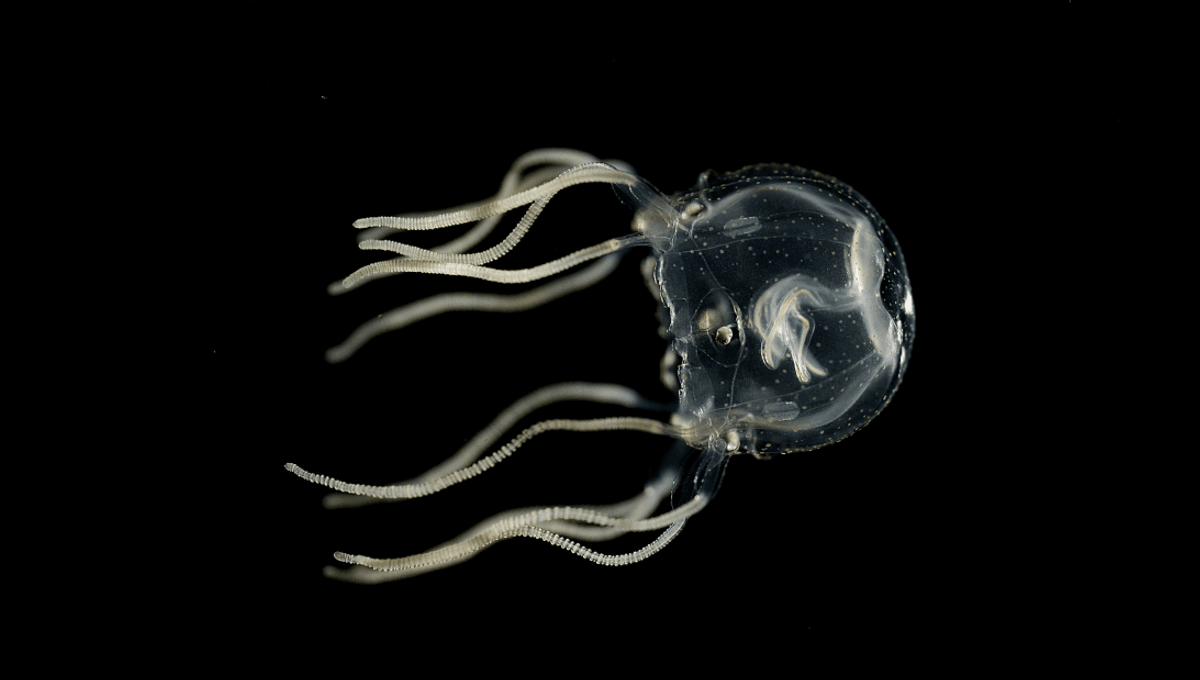
For the first time, scientists have discovered that jellyfish can learn from past experiences and change their behavior in response, despite lacking a central brain. The findings of a new study suggest they’re much more complex than previously thought, which is particularly remarkable for an animal with so few nerve cells.
Box jellyfish (Tripedalia cystophora) have no central brain and instead move around with the aid of a simple nervous system made up of just 1,000 cells. These nerve cells exist in a loose network called a nerve net that’s spread across their gooey bodies, and it helps them to sense the environment, detecting changes in temperature, light, as well as physical touch.
Animals with simple nervous systems like the box jellyfish were thought to only be capable of the most basic forms of learning, like habituation in which an animal gets used to a change in conditions, like noise. More complex learning like changing behavior in response to past experiences was thought to be far beyond these animals, but new research has just blown that idea out of the water.
It focused on the Caribbean box jellyfish that hunts copepods with the help of 24 eyes. Its hunting grounds are treacherous as they must approach mangrove roots to reach the copepods. Get too close and they risk injuring their squishy bodies, but if they don’t get close enough, they won’t eat.
To establish how the jellyfish survived this daily dance with death, they conducted experiments using round tanks lined with bars to mimic mangrove roots that looked far away. Initially, the jellyfish were bumping into the “far away” stripes, but across the 7.5-minute experiment window, the number of bumps dropped by 50 percent.
As the experiment ticked on, the jellyfish were backing away from the tank walls and eventually successfully pivoting away from the obstacles. A very simple animal would be expected to continue bumping into the same obstacles, and yet here was our humble jellyfish learning from visual and mechanical stimuli.
“Our experiments show that contrast, i.e., how dark the root is in relation to the water, is used by the jellyfish to assess distances to roots, which allows them to swim away at just the right moment. Even more interesting is that the relationship between distance and contrast changes on a daily basis due to rainwater, algae, and wave action,” neurobiologist Anders Garm explained in a statement.
“We can see that as each new day of hunting begins, box jellyfish learn from the current contrasts by combining visual impressions and sensations during evasive manoeuvres that fail. So, despite having a mere one thousand nerve cells – our brains have roughly 100 billion – they can connect temporal convergences of various impressions and learn a connection – or what we call associative learning. And they actually learn about as quickly as advanced animals like fruit flies and mice.”
The discovery is big news for neuroscience, as it disproves previous assumptions about what simple nervous systems are capable of. And those “brainless” jellyfish? Not so brainless after all.
The study is published in Current Biology.
Source Link: Jellyfish Are Capable Of Something Scientists Never Dreamed They Could Do